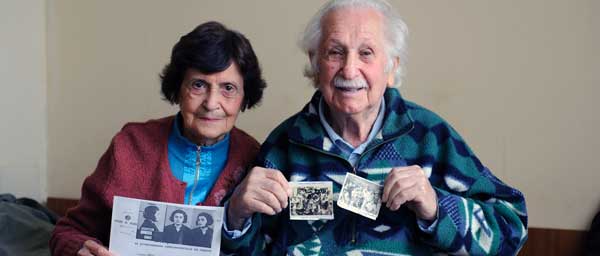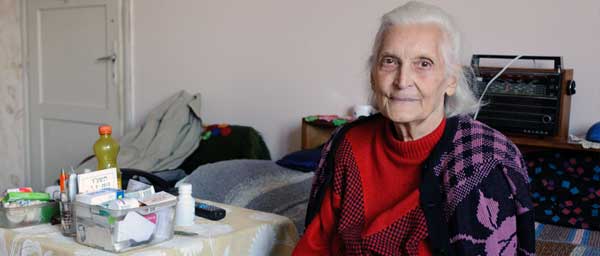
When homecare funding for Bulgarian Jewish Holocaust victims was increased in early 2011, the additional allocations available pushed the service to the top of the priority list for elderly survivors. But because homecare was not part of the Bulgarian family-oriented culture, Jewish community leaders had an uphill battle trying to convince those who needed it most of its benefits.
In early 2011, Berta Nisim Levi-Vladimirova of Sofia said she didn’t see the point of home help. But Berta, who lives in a fifth-floor walk-up apartment with her disabled son, finally agreed to have a homecare aide assist her. And now, the change in Berta’s life has been as dramatic as the change in her attitude towards homecare services.
Though Bulgarian Jews were not killed or deported out of the country during the war, Jewish men were sent to Bulgarian labor camps and Jewish women and children were sent to ghettos as a result of anti-Semitic legislation passed in 1941. Jews living in the Bulgarian-occupied territories of Macedonia and Thrace were sent to concentration camps; about 12,000 were murdered by the Nazis.
About a decade ago, the Claims Conference had pressed the German government intensively to permit Bulgarian survivors to receive pensions. Diligent Claims Conference research revealed new information about the wartime experiences of Bulgaria’s Jews, including the harsh treatment, malnourishment and exploitation of Jewish men who were forced to work as slave laborers.
Out of an estimated 800 Nazi victims today in the 8,000-member Bulgarian Jewish community, 510 receive services from the Claims Conference. And 336 people – fully two-thirds of those Nazi victims we serve – receive homecare.
Berta was 14 when she was forced during the war to work on vegetable plantations, at a can factory and at a brick factory. Often the Jewish workers slept in cold fields
without water or food.
Berta, Bulgaria

Berta was 14 when she was forced during the war to work on vegetable plantations, at a can factory and at a brick factory. Often the Jewish workers slept in cold fields without water or food.
Now 85, Berta sings the praises of the aide who helps her twice weekly, and who is paid by Shalom, the Bulgarian Jewish community’s social service agency, with funding from the Claims Conference. “I saw that homecare is a great help when someone can help with the basics,” Berta said. “It gives me more strength and time to help my son, and to be active and useful and participate in communal projects.”
Berta used to stop three times on the way to the grocery store to gather her strength. Now the homecare worker does the food shopping, and Berta uses her new-found energy to visit the Jewish community center, where she participates in discussions about Jewish life and visits the canteen for meals.
Before Berta had homecare assistance, she was concerned only with helping her son; now, she spoke about her love of her newfound activities. She is part of a committee preparing a commemoration of the 70th anniversary of the rescue of the country’s Jews by the leaders of Bulgaria’s Orthodox Church. Berta is full of ideas, including creating a brochure of Jewish contributions to Bulgarian culture. “It’s really important that Jewish parents teach the children Jewish values and Jewish history,” she said.
Berta has received a one-time payment of €2,556 from the Holocaust Victim Compensation Fund, which she saved for the care of her 59-year-old son, who recently underwent a third heart-bypass operation. Berta, who has kidney and heart problems, also receives medicines, food from the canteen at the JCC, and medical and dental care from Shalom. “People live here in poverty, but we are privileged that we are Jewish and we have assistance from the Claims Conference and Shalom,” she said.
Shmuel and Rivka Benun also know how much new homecare services have helped them. The couple, now 91, met in a Plovdiv Jewish school when they were both 7 years old. They now receive homecare and other assistance through Shalom.
Shmuel, like the majority of Jewish men in Bulgaria, was sent to a labor camp within the country. In 1943, while he was building a railroad, he saw a train of cattle cars pass by, filled with Jews from the Bulgarian-occupied Thrace, including his cousin, all being sent to a concentration camp. When Shmuel escaped the labor camp in 1944, he joined the partisans fighting the Nazis.
He stayed with the partisans until September 1944, when a coup d’etat overthrew the Bulgarian government and the new leaders encouraged the partisans to return home. So Shmuel returned to Plovdiv and enlisted in the Bulgarian Army to fight the Germans. He was injured twice in battle and retired with the rank of lieutenant colonel.
A teenaged Rivka was arrested many times for her wartime efforts fighting fascism. While women were not sent to labor camps, they were confined to their homes for all but two hours a day, when they were allowed out to find food. After the war ended, Rivka’s four sisters and her brother all made aliyah, leaving her alone in Bulgaria.
Rivka and Shmuel married in 1947. They have one son, who lives in Denver. Shmuel is now the hazzan, the cantor, at the synagogue in Plovdiv, a city with the country’s second-largest Jewish population. He is continuing the Ladino-Sephardic religious tradition in Bulgaria, through tunes he learned at his father’s knee.
Because of his years spent in a labor camp, Shmuel receives a pension from the Claims Conference’s Central and Eastern European Fund, which increased on July 1, 2013 from €300 to €310 per month. The couple has high electricity and heating bills, and Shmuel said that if he didn’t receive the CEEF pension, the couple would be “completely lost.”
It was a struggle to convince the Benuns to accept homecare services, but now their aide is “a member of the family,” Shmuel said. “She made our life so much easier and pleasant,” he said. “I couldn’t perform basic activities without her.”
Berta Nisim Levi-Vladimirova is grateful to the Claims Conference. “I thank the Claims Conference from the bottom of my heart for everything,” she said. “For 35 years I have been a widow, and I am head of the family with all its responsibilities on my shoulders.”
Seeing such a quick and clear change in attitudes towards home assistance reinforces to us that our goal of enabling elderly Jewish Nazi victims to live independently at home can indeed work and must continue for as long as needed.

